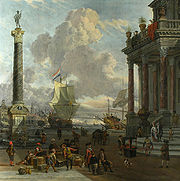- Customs war
-
Trade barriers
Tariffs · Non-tariff barriers
Import quotas · Tariff-rate quotas
Quota share · Import licenses
Customs duties · Export subsidies
Technical barriers · Bribery
Exchange rate controls · Embargo
Safeguards
Countervailing duties
Anti-dumping duties
Voluntary export restraintsOrganizationsBy CountryA Customs war, also known as a toll war or tariff war, is a type of economical conflict between two or more states. In order to pressure one of the states, the other raises taxes or tariffs for some of the products of that state. As a reprisal, the latter state may also increase the tariffs.
One of the latest toll wars happened in the 1920s and 1930s between the Weimar Republic and Poland. The earlier state, led by Gustav Stresemann wanted to force Poland by creating an economic crisis to give up its territory and increased the tolls for coal and steel products developed there. As a reprisal, the Poles increased toll rates for many German products. This led to fast development of the port of Gdynia, which was the only way Poland could export its goods to Western Europe without having to transport them through Germany.
In September 1922 the Fordney-McCumber Tariff (named after Joseph Fordney, chair of the House Ways and Means Committee, and Porter McCumber, chair of the Senate Finance Committee) was signed by President Warren Harding[1]. In the end, the tariff law raised the average American ad valorem tariff rate to 38 percent.
Trading partners complained immediately. Those injured by World War I said that, without access by their exports to the American market, they would not be able to make payments to America on war loans. But others saw that this tariff increase would have broader deleterious effects. Democratic Representative Cordell Hall said, "Our foreign markets depend both on the efficiency of our production and the tariffs of countries in which we would sell. Our own [high] tariffs are an important factor in each. They injure the former and invite the latter."
Five years after the passage of the tariff, American trading partners had raised their own tariffs by a significant degree. France raised its tariffs on automobiles from 45 % to 100 %, Spain raised tariffs on American goods by 40 %, and Germany and Italy raised tariffs on wheat.[2]. This customs war is often cited as one of the main causes of the Great Depression.
To avoid customs wars which are considered harmful to the world's economy, the World Trade Organization was created.
References
- Rothgeb, John (2001). U.S. Trade Policy. Washington D.C.: CQ Press. ISBN 1-56802-522-X.
- Smoot-Hawley Tariff Act. (2005). Encyclopædia Britannica. Retrieved October 15, 2005, from Encyclopædia Britannica Online
Categories:- International economics
- Customs duties
- Trade wars
- Trade stubs
Wikimedia Foundation. 2010.

